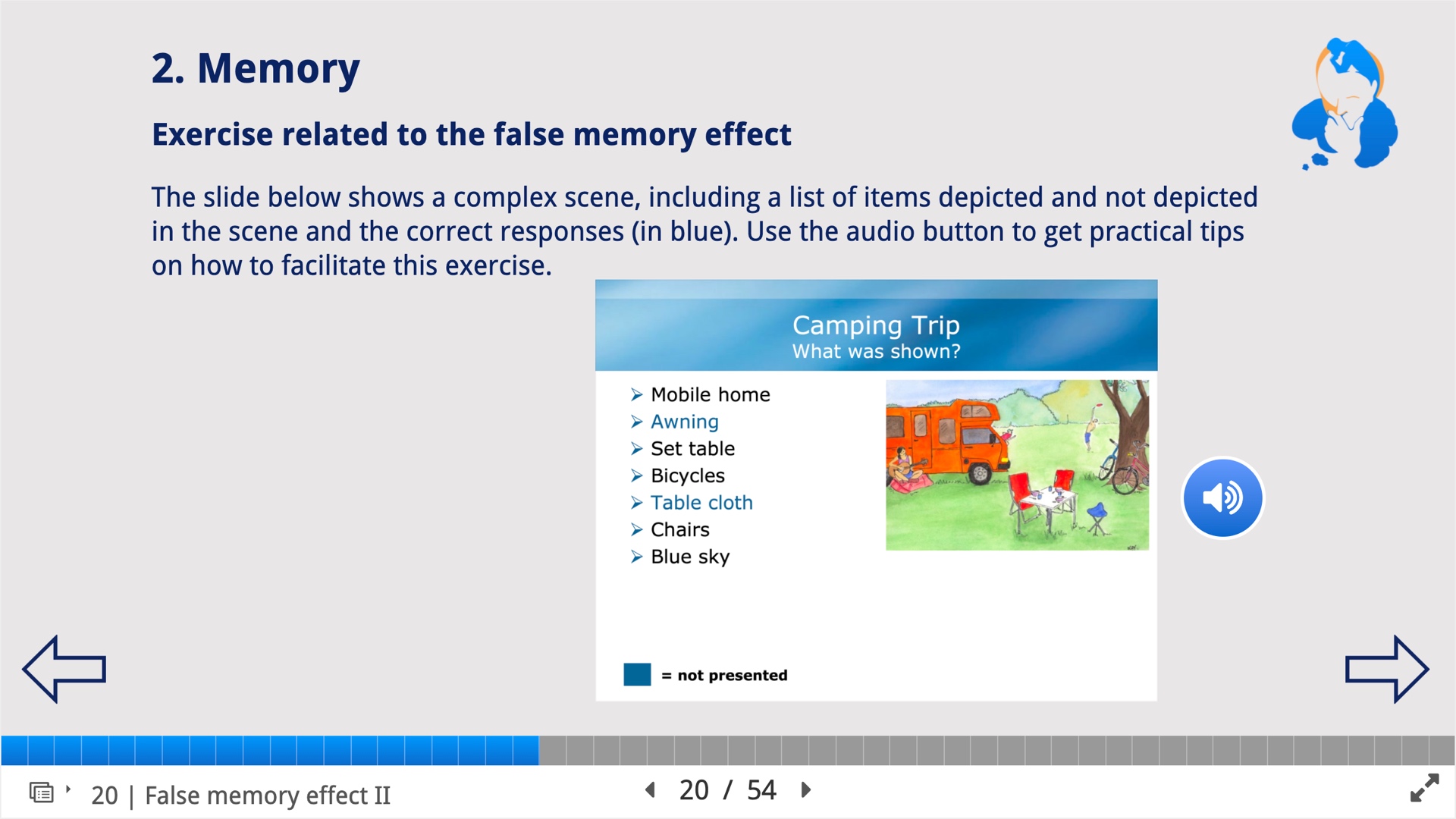Certified Online Training: Metacognitive Training for Depression (D-MCT) and for Depression in Older Adults (MCT-Silver)
English |
German |
Spanish |
Ukrainian |
This is an accredited training for psychotherapists and neuropsychologists.
This self-guided online training on metacognitive training for depression can be done at your own pace. No special software is needed.
here.
Background
Metacognitive Training for Depression (D-MCT; Jelinek et al., 2015) is a slide-based group program that incorporates principles of cognitive-behavioral therapy (CBT) for depression (e.g., normalizing of "negative thoughts" and identifying depressive thought patterns) but has a slightly different treatment focus. The program is primarily intended to strengthen participants' metacognitive abilities by reducing cognitive biases. Additionally, the training challenges dysfunctional coping strategies (e.g., rumination, social withdrawal). We have also developed an adaptation of this approach for older patients with depression: the Metacognitive Training for Depression in Older Adults (MCT-Silver).
The D-MCT is based on the German manual Metakognitives Training bei Depression (D-MKT) by Jelinek, Hauschildt, and Moritz (this full manual is currently available only in German and Japanese and needs to be purchased). An abridged version of the manual in English, including information on how to facilitate MCT-Silver, is available free of charge on our homepage, as are all of the English-version slides of the D-MCT (www.uke.de/depression) and MCT-Silver (www.uke.de/mct-silver).
The five learning units of our (self-guided) online course (registration via https://uke.eu.qualtrics.com/jfe/form/SV_eED6KO9rK9Mhw2O) include texts, audio files and videos, interactive exercises, and graphics. The course describes how to facilitate group D-MCT and MCT-Silver and how to handle difficult therapeutic situations. The self-study format lets you decide when and at what pace to complete the training. You will not be required to install any special software on your computer.
Those who complete the training and pass the test will get this official certificate, which credits their contribution and recognizes them as an official D-MCT trainer:

Certification and Requested Donation
When you have completed the training, you will have the opportunity to take a test to check your knowledge. If you pass the test, you will receive a certificate verifying your successful completion of the training. It also acknowledges your contribution and recognizes you as an official D-MCT/MCT-Silver trainer.
We kindly request a donation of 100€/$100 (50€/$50 for psychologists in training) for the online training. If you are interested in taking the training but cannot afford this amount, send an e-mail to l.jelinek@uke.de (Lena Jelinek). Please click on the following link to make your donation: donate (*). You can also donate using PayPal via this secure online portal: donate via betterplace. You will receive an official receipt for your donation.
Other e-learning courses (online trainings):
- Metacognitive Training (MCT) for Psychosis: www.uke.de/e-mct
- Body-Focused Repetitive Behaviors (e.g., trichotillomania): www.uke.de/e-bfrb-training
Aims/What you will learn
The aim of this training is to prepare you to conduct D-MCT and MCT-Silver groups.
After completing the training, you will
- be familiar with the empirical findings regarding the effectiveness of D-MCT,
- be familiar with the content and background of D-MCT and MCT-Silver,
-
be familiar with typical cognitive biases/distortions in depression and know how to address them inD-MCT and MCT-Silver,
- be familiar with the various types of exercises that are used in D-MCT and MCT-Silver,
- know how to facilitate D-MCT or MCT-Silver, and
- know how to deal with difficult therapeutic situations in D-MCT or MCT-Silver.
The online training consists of a total of five learning units that contain many practical tips as well as videos (some in German with English subtitles), interactive exercises, and illustrations to give you ideas for setting up and conducting D-MCT or MCT-Silver.
If you have already completed our online training on MCT for Psychosis, you will be familiar with much of the content in the introductory learning unit. We have designed this program so that facilitators do not need prior knowledge of the MCT for Psychosis to take the e-learning on D-MCT or MCT-Silver.
About the training
The D-MCT/MCT-Silver training consists of a total of five learning units with a total duration of approximately 5.5 hours (45–60 minutes each). The introduction to the framework and the general structure of the training (learning unit 1) is followed by two learning units introducing the various modules of the training (learning units 2 and 3). Learning unit 4 is devoted to content in MCT-Silver that is different from D-MCT. Finally, learning unit 5 discusses difficult situations that may occur during sessions.
Here are a few examples from the introduction to D-MCT and MCT-Silver (learning unit 1), as well as learning unit 2 for the D-MCT module 2 on memory:
Additional information
The English D-MCT slides for use in sessions as well as the English abridged manual can be downloaded at no cost via https://clinical-neuropsychology.de/metacognitive_training_for_depression/. The MCT-Silver slides and manual are available here at no cost: https://clinical-neuropsychology.de/metacognitive-training-for-depression-mct-silver/
The e-training does not replace careful study of the manual.
Registration
To register, simply click on this link: Registration. We will process your request within four days (usually less). Please check your spam folder regularly as automatically generated emails are rejected by some email service providers.
Technical requirements
We recommend that you use Mozilla Firefox for this e-learning, which can be downloaded online at no cost.
In order to ensure the best possible presentation of the content, we recommend always working on the e-learning in full-screen mode.
Main developers of the D-MCT/MCT-Silver e-training
- Prof. Dr. Lena Jelinek
- Dr. Brooke Schneider
- Dr. Ruth Veckenstedt
- Dr. Marcel Riehle
- Stefanie Hahn
- Arne Sibilis
- Prof. Dr. Steffen Moritz
Collaborators
- Carsten Baasch
- Hummelwerk Film Production


